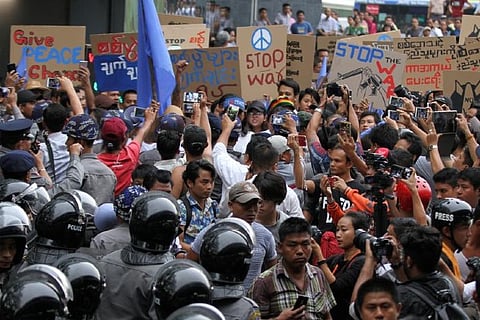

Chennai
That this takeover was strongly rumoured, even expected to occur, demonstrates where the real power in Myanmar’s fragile democracy lies. With the detention of Aung Sang Suu Kyi, who led her National League for Democracy (NLD) to a landslide win in the November 2020 election, and Win Myint, sometimes described as her nominal or puppet President, Myanmar’s short-lived experiment with quasi-democracy has abruptly ended.
Quasi-democracy, because irrespective of civilian rule, the country lived under the shadow of the powerful military. The Constitution was written under its supervision, and the military is allotted reserved seats in both houses of Parliament. It has contested the result of the November election, where the party it backs was severely drubbed. But its allegations of massive voter fraud appear to have no basis, or at least no solid evidence, having been dismissed by the country’s election commission. The state of Emergency is valid for one year, but going by the various statements made by the Commander-in-Chief General Min Aung Hlaing, it is not clear whether the Constitution will be retained in its present form and Myanmar restored to democracy.
The chokehold the Army had on the country is one of the reasons that the Nobel Prize-winning Suu Kyi, once celebrated as an iconic defender of human rights, struck unjustifiably compromising positions on critical matters. The Rohingya Muslim issue may be a complex one, but nothing justifies the kind of repression unleashed on this minority, which has been forced to migrate in large numbers, mainly to neighbouring Bangladesh. While sections in the international community declared the Rohingya were subjected to a form of genocide, Suu Kyi chose to defend the Army, arguing unconvincingly that it was only responding to terror attacks on its outposts.
If her purpose in doing so was to maintain the delicate sharing of power between the military and the civilians, then she went much too far in trying to protect this arrangement. Any real and durable restoration of democracy in Myanmar will depend on an arrangement where the Army agrees or is either forced to agree to surrender its claims on the levers of political power.
While New Delhi has expressed deep concern about the developments, a very cynical Beijing has all but welcomed the coup with open arms, with sections of the official Chinese media suggesting it is nothing more than a major Cabinet reshuffle. With a Biden administration likely to press hard for a restoration of democracy, there is the very real possibility that Myanmar’s relations with China will be further consolidated, a matter of worry for India.
Like some other countries in the region, Myanmar is reeling under a massive Chinese debt trap, which is going to be difficult to extricate itself from. Its recent overtures to India were in part an attempt to strike a balance, but the coup has freed Beijing to expand its influence in the country.
Visit news.dtnext.in to explore our interactive epaper!
Download the DT Next app for more exciting features!
Click here for iOS
Click here for Android